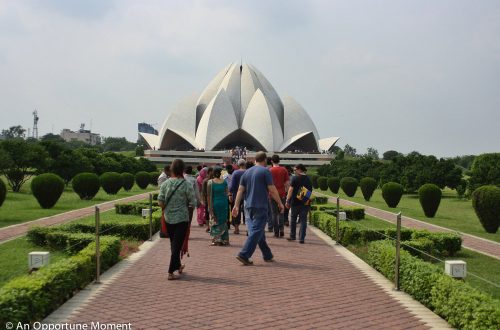(This post picks up where the previous one left off.)
After we’d walked through and around and past the beggars, my tour group arrived at the Lotus Temple, which is a Bahá’í House of Worship. It’s open to people of any and all faiths and is meant to be a place for praising God without denominational restrictions. While the outside of the Lotus Temple is a beautiful work of architecture, the inside is almost plain — cavernous and filled with wooden pews, but simple.

I realize the irony of pushing past people in need in order to visit a place of spirituality, but at the time, I just sat down, said a prayer for my loved ones, and watched people file in and out. The Lotus Temple is meant to be silent, but there was a low murmur inside — whispered conversations, camera clicks, shuffling feet. I caught the eye of a young Indian girl walking behind her mother and we smiled at each other. Smiling is such a small gesture between strangers, but it meant a lot to me throughout my trip to India. As did hearing the greeting, “namaste.”
“Namaste” is the Hindi word for “hello,” and it comes from the words “namah” (reverential salutations) and “te” (to you). The literal translation of “namaste” is “salutations to you,” and it’s a simple greeting.
However, I first learned the word, “namaste,” at a church retreat when I was 14, and it was the most beautiful idea I’d ever heard conveyed in 7 letters. This is because the definition I learned focused on the reverential part of “namah.” These are not just any salutations, they are filled with respect and love. When I learned it, “namaste” meant “the God in me respects and acknowledges the God in you.” It was a profound sentiment: “I see you as a Godly being, like me, and I greet you with a Godly love.”
When strangers in India said to me, “namaste,” a word that is often accompanied by a slight bow, with the palms of one’s hands pressed together before one’s chest, I was filled with joy and appreciation. Logically, I knew they were saying, “hey,” as casually as people in the US might say “what’s up?” or “how are you?” without expecting a genuine answer, but I could not forget the spiritual meaning I had first learned. It felt like being blessed everywhere I went, and I was inspired to reply with a blessing of my own. It was fulfilling to greet strangers with reverence, to acknowledge both their humanity and their Godliness in something as simple as a “hello.”
It feels trite to suggest that I should have greeted every beggar on the walk to the Lotus Temple with “namaste,” as if that could make their poverty less complex or painful. But, as I try to lead a more righteous life, greeting everyone I meet with a reverent hello might be a good place to start. And I don’t mean appropriating the word “namaste,” and using it in my daily life in the US; I mean imbuing my words with beautiful ideas, and giving people my full attention, such that “namaste” and “hello” are truly “reverential salutations.”





